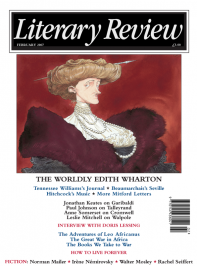Gillian Tindall
The End of Love
Edith Wharton
By Hermione Lee
Chatto & Windus 852pp £25
It is a strange fate for a celebrated writer to be remembered as the friend of a still more famous one. Such, for a generation after her death in 1937, was Edith Wharton’s lot. Her novels were out of fashion, indeed had been consigned to that limbo of all things ‘Victorian’ – ‘prim’, ‘mannered’, ‘violets and old lace’, etc – by a consciously modern public who simply supposed her books to be like that, from their setting in old New York, without actually reading them. Her personal image was of a large, rich, imperious old lady who – ah, ha – had seized on poor Henry James who was too polite to resist her and bore him off on wild journeys across France by chauffeured car. Did not James himself write piteously to friends of her ‘unappeasable summons’, and refer to her as an ‘eagle’ swooping down on him and as ‘the Angel Devastation’? And had not others complained about her bossiness, her arbitrary changes of plan, her chilliness to people who did not measure up to her own high social or intellectual standards, and her nineteenth-century assumption (correct, as it turned out) that her life would always be well padded with servants and that this was her right?
It was, actually, all true, but what a partial truth. Like all proper writers, the creator of Undine Spragg and Lily Bart (not to mention the lower-class Bunner sisters) was a far more complicated, vulnerable and perceptive person than the grande dame of posthumous myth. With R W B Lewis’s

Sign Up to our newsletter
Receive free articles, highlights from the archive, news, details of prizes, and much more.@Lit_Review
Follow Literary Review on Twitter
Twitter Feed
Under its longest-serving editor, Graydon Carter, Vanity Fair was that rare thing – a New York society magazine that published serious journalism.
@PeterPeteryork looks at what Carter got right.
Peter York - Deluxe Editions
Peter York: Deluxe Editions - When the Going Was Good: An Editor’s Adventures During the Last Golden Age of Magazines by Graydon Carter
literaryreview.co.uk
Henry James returned to America in 1904 with three objectives: to see his brother William, to deliver a series of lectures on Balzac, and to gather material for a pair of books about modern America.
Peter Rose follows James out west.
Peter Rose - The Restless Analyst
Peter Rose: The Restless Analyst - Henry James Comes Home: Rediscovering America in the Gilded Age by Peter Brooks...
literaryreview.co.uk
Vladimir Putin served his apprenticeship in the KGB toward the end of the Cold War, a period during which Western societies were infiltrated by so-called 'illegals'.
Piers Brendon examines how the culture of Soviet spycraft shaped his thinking.
Piers Brendon - Tinker, Tailor, Sleeper, Troll
Piers Brendon: Tinker, Tailor, Sleeper, Troll - The Illegals: Russia’s Most Audacious Spies and the Plot to Infiltrate the West by Shaun Walker
literaryreview.co.uk